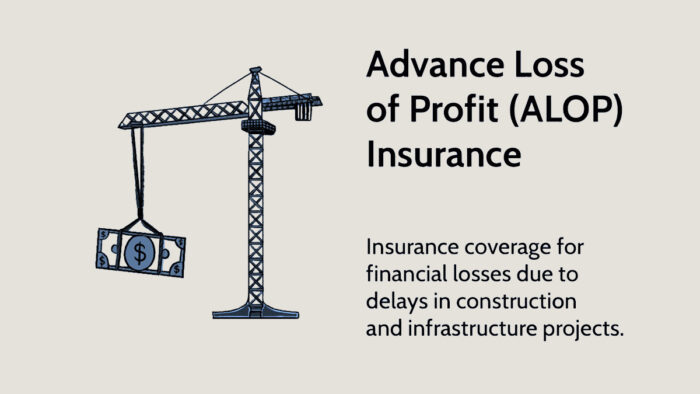Advance Loss of Profit (ALOP) insurance is designed to provide protection against income loss resulting from delays in the timely completion of construction or infrastructure projects due to specified property damage. This insurance coverage not only safeguards the business associated with the project but also operates in conjunction with the builder’s risk insurance policy held by the construction company.

The builder’s risk policy is responsible for covering the costs associated with repairing or replacing damaged or destroyed property and materials caused by covered perils such as fire, theft, vandalism, or lightning.
ALOP policies encompass coverage for lost gross profits and can extend to additional expenses like soft costs and the engagement of extra contractors, incurred to either mitigate delays or expedite project completion.
Referred to by various terms such as Delay in Start-Up (DSU) insurance, Delayed Opening Insurance, or within a builder’s risk policy for construction companies as Delayed Completion Coverage or Soft Costs Coverage, ALOP insurance plays a vital role in managing risks linked to project delays due to property damage.
How Does Advance Loss of Profit (ALOP) Work?
Advance Loss of Profit (ALOP) insurance operates by safeguarding the principal’s lost gross profit in instances where property damage from a covered peril leads to delays in the completion of a construction project.
The principal, typically the client of the construction company or contractor, stands to benefit from this coverage.
Calculating the principal’s loss of profit can be intricate, but fundamentally, it involves estimating the revenue the principal would have generated if the project had proceeded as planned, subtracted from the actual revenue earned during the delay period.
ALOP policies may also cover increased costs of working (ICOW) and soft costs that may arise. ICOW assists in mitigating losses by funding overtime shifts, additional labor, and the use of more readily available materials.
Soft costs encompass expenses beyond materials and labor, including engineering or contractor fees, legal and administrative expenses, property taxes, loan interest payments, and marketing updates.
In a scenario where a fire disrupts construction at an apartment complex, leading to a project delay, ALOP insurance can step in to cover lost rental income, loan interest payments, and permit costs incurred due to the setback.
Understanding key coverage periods such as the insurance period, indemnity period, delay period, and time deductible period is crucial for the principal when selecting ALOP insurance coverage.
What Does Advance Loss of Profit (ALOP) Insurance Not Cover?
Advance Loss of Profit (ALOP) insurance does not cover financial losses beyond reasonable gross profit, soft costs, or increased costs of working (ICOW) as specified in the policy and by the claims adjuster.
It excludes coverage for the financial obligations of construction companies or contractors unless additional coverage is purchased.
ALOP insurance does not provide compensation for rental properties or products being sold if there are no renters or buyers.
It does not address delays unrelated to covered property damage, and there is no coverage for losses outside the ALOP’s insurance period, indemnity period, delay period, or within the time deductible period.
In cases of weather-related construction delays, weather insurance can serve as a form of income stabilization.
How Much Does Advance Loss of Profit (ALOP) Insurance Cost?
The pricing of Advance Loss of Profit (ALOP) insurance exhibits significant variability, influenced by a range of factors. Elements such as the duration of coverage periods, the extent of coverage limits, the inclusion of additional expenses, projected revenue estimates, and the historical record of past claims all play pivotal roles in determining insurance premiums.
Various intricacies within these factors contribute to the nuanced calculation of ALOP insurance costs, making it a dynamic and tailored financial consideration for businesses seeking comprehensive protection against income loss due to project delays.
Who Needs Advance Loss of Profit (ALOP) Insurance?
Advance Loss of Profit (ALOP) insurance is essential for entities dependent on the timely completion of construction or development ventures to commence generating income. Businesses operating in sectors where project completion directly impacts revenue generation find ALOP insurance invaluable.
Moreover, construction firms and developers have the option to acquire comparable coverage for soft costs and project delays within their builder’s risk policies, ensuring comprehensive protection against financial setbacks stemming from unforeseen delays or property damage.
The strategic adoption of ALOP insurance caters to the specific needs of businesses and stakeholders involved in projects susceptible to disruptions, offering a proactive financial safety net to mitigate potential income losses and operational challenges.
FAQs
What is the advance loss of profit policy?
The Advance Loss of Profit (ALOP) policy protects against financial losses due to delays in construction projects, covering lost gross profits, additional expenses, and increased costs of working (ICOW) caused by covered perils like fire or theft.
What is the loss of insurance called in ALOP?
In ALOP insurance, the loss of insurance is referred to as the actual loss of gross profit resulting from a delayed project, triggered by specific events outlined in the policy language.
What are the two types of losses in insurance?
In ALOP insurance, the two types of losses typically covered are the loss of gross profit and additional expenses incurred due to project delays, such as soft costs and increased costs of working (ICOW).
Where is insurance recorded in the profit and loss account?
Insurance, including ALOP coverage, is recorded in the profit and loss account as a financial safeguard against potential losses from project delays, ensuring protection for the principal’s anticipated earnings following project completion.



